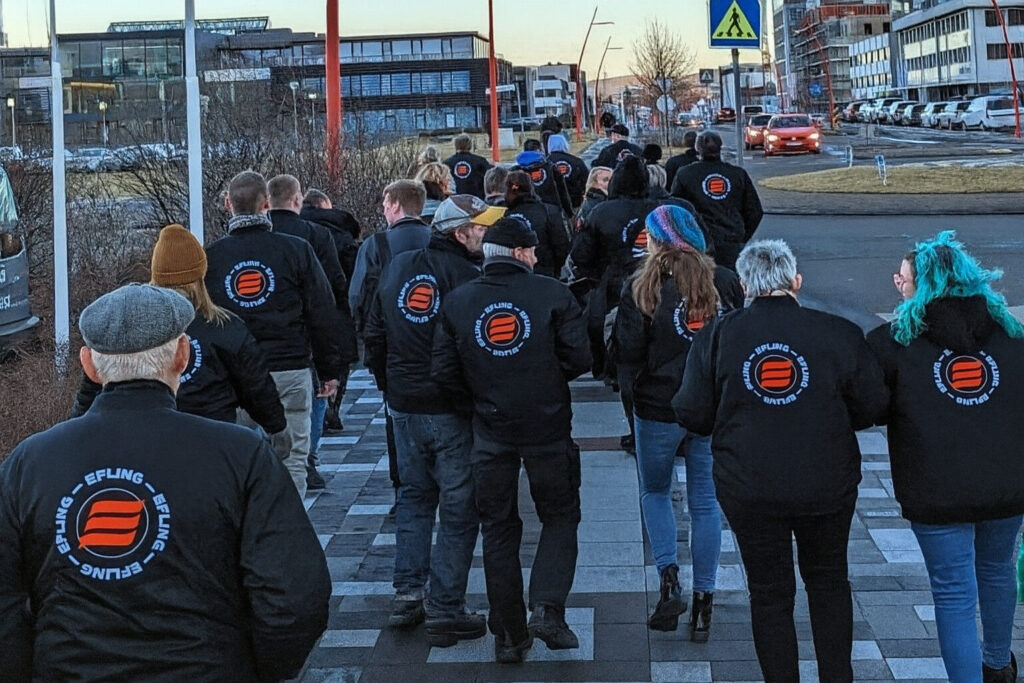
The board of Efling Union raises concerns about comments made by Finnbjörn Hermannsson, President of the Icelandic Confederation of Labour (ASÍ), regarding the results of a survey by Varða on the situation of wage earners in Iceland. The survey, published on 1 October, shows that 30% of wage earners experience significant financial hardship, while 70% are doing well.
Efling criticizes the ASÍ president for diverting attention from systemic causes of class division and inequality in the labour market and placing responsibility on individuals, immigrants, and their educational background. The union emphasizes the importance of collective wage agreements, particularly flat-rate increases, as the most effective way to improve the purchasing power of low-income workers and reduce inequality.
Resolution of the Board of Efling, adopted at a meeting on 2 October 2025
The board of Efling raises objections to the statements of Finnbjörn Hermannsson, President of the Icelandic Confederation of Labour (ASÍ), regarding the results of a Varða survey on the situation of wage earners in Iceland. The survey, published on 1 October, shows that 30% of wage earners face significant financial difficulties, while 70% are doing well.
In an interview with mbl.is, the ASÍ president, asked about the survey results, said that “many factors other than wage differences cause 30% of wage earners to live in poverty.” He emphasized that the education of immigrants must be fully recognised. He also mentioned the lack of Icelandic language skills and noted that immigrants do not have so-called networks: “Icelandic language skills are, of course, a major factor. Then there are networks and systems around Icelanders, but not around them. It is a fact that people generally get better jobs through networks than through advertisements.” According to him, this makes immigrants as a group “more exposed to low-paid work despite higher education.”
Efling’s board criticizes the lack of awareness of class structures reflected in the ASÍ president’s comments. Instead of acknowledging that the difficult situation of workers in Iceland is caused by systemic factors—such as employers’ demands for cheap labour to drive the wheels of the economy—he resorts to superficial and misleading analyses. Employers benefit from the ASÍ president’s perspective, which shifts responsibility from employers to public systems and individual factors, such as education.
The ASÍ president seems unaware that the goal of employers bringing in foreign labour is to maximize profit at the expense of workers’ wages. This is achieved through deliberate and systematic methods: systems are in place to enable high levels of labour importation to keep wages low. Workers are made to work at excessively high speeds to maximise company profits. Workers are made to work under multiple supervisors to reduce labour costs, and are dismissed if they are likely to seek ways to improve conditions for themselves and their colleagues.
Highly educated unions also contribute to maintaining this poor state by promoting the notion that the only recognised path to financial security is through formal education. Efling criticizes the ASÍ president for supporting arguments used by BHM and other representatives of the educated class, arguments deliberately designed to divert public attention from the exploitative system under which workers operate.
Efling expresses disappointment that the statements of the union’s negotiating team and the courageous workers who have led wage struggles through strike actions in the Reykjavík area have not reached the ASÍ president. It is the responsibility of ASÍ leadership to honestly face the serious challenges workers encounter due to class division and inequality in Icelandic society.
The ASÍ president addresses profound societal issues superficially. Efling points out that the situation of immigrant workers is not a coincidence, nor caused by a lack of Icelandic language skills or networks. It is a logical outcome of the economic system, which thrives on class division and inequality.
“We need to take action because this workforce represents a tremendous resource we are failing to utilise. It would benefit Icelandic society to address this, and although their education may differ from ours, it can still be valuable,” the ASÍ president said in an interview with mbl.is. Efling questions whether the ASÍ president does not recognise that work in manual labour is a contribution to society.
Efling, representing approximately 30,000 members in the Greater Reykjavík Area, reminds that ASÍ is a federation of trade unions in the general labour market. The primary role of trade unions is to negotiate collective agreements with employers, and through successful collective bargaining, unions have historically achieved their goals. Data from the Wage Statistics Committee clearly shows that the most effective way to increase the purchasing power of all low-wage groups in Iceland is through collective agreements that include flat-rate increases rather than percentage-based raises, along with special increases for the lowest-paid groups.
Following the significant success of flat-rate increases in the 2019–2020 bargaining round, highly educated and high-income unions within ASÍ have sought to prevent such agreements from continuing. The only rational conclusion from the Varða survey is that the path of flat-rate increases should be maintained. Regrettably, the ASÍ president participates in diverting the debate away from the fight against inequality in Icelandic society.